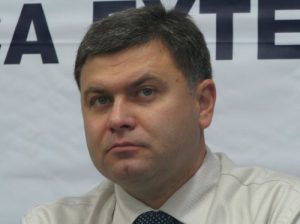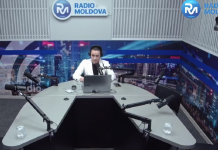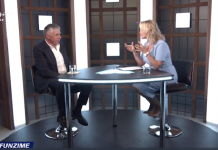Corneliu RUSNAC, moderator Imedia: Good day, dear listeners! I am Corneliu Rusnac and I welcome you to a new edition of the broadcast of discussions on topics of foreign policy, produced with the support of the „Foreign Policy Association” and financed by the „Friedrich Ebert” Foundation.
Today, our guests are Victor Chirila, Executive Director of the Foreign Policy Association and Radu Vrabie, Programme Director at the same Association. In our today programme we are going to discuss, especially, about the transnistrian issue, an issue discussed also in the framework of the recent meeting of the Prime Minister Vlad Filat in Berlin with the German Chancellor Angela Merkel. A press release issued by the Chisinau Government announces that after the meeting there will be restarted in June this year the negotiations regarding the transnistrian crisis that were interrupted in 2006. Should we understand that the main actors involved in the transnistrian problem came to a consensus in this aspect and how did it happen?
1.Restarting the official negotiations in 5+2 format
Victor CHIRILA, Executive Director of the Foreign Policy Association: It is hard to say now that the involved actors came to a consensus. Majority of important actors, and I mean here United States of America, Russian Federation, European Union and especially Germany as a EU representative, support the idea of restarting as soon as possible the negotiations. R. of Moldova as well wants to restart the negotiations without any preliminary conditioning. However, this thing is not shared by Tiraspol, but we all know that Tiraspol is influenced by Moscow especially when this is mostly wanted. Without any doubts, if the Russian Federation will make the necessary efforts we could be witnessing in June the official restart of negotiations in 5+2 format.
Corneliu RUSNAC: Mr. Vrabie?
Radu VRABIE, Programme Director of the Foreign Policy Association: For sure in the last period we notice an intensification of the international efforts in settling this problem. It is important that Germany joined this process, as it is an important country in the EU. It the same time, we have some reserves when it comes to the results of the negotiations. First, because of the fact that Russia, which apparently supports R. of Moldovas position and its territorial integrity, continues to strengthen Tiraspol regime and thus, sending double signs. On one hand, we have openness; on the other hand the President of the State Duma Foreign Affairs Committee Mr. Kasaciov states that regardless of the transnistrian conflict settlement we cannot speak about a united R. of Moldova, something that we really want in fact. Secondly, we see what is happening in Tiraspol, when Vladimir Iastrebceak, the Transnistrias political representative during the negotiations in 5+2 format was directly criticized by Vladimir Antiufeev, chief of the Transnistrian MGB for the fact that he is too pro-European. Also, Smirnov supported this critic and gave order to Iastrebceak to be more cooperative with the transnistrian intelligence, to inform it about everything and coordinate all the steps that he is doing on external ground. This thing makes me think that in the framework of the negotiations, the transnistrians will be more careful in taking decisions
The second thing that I believe is important is that the settling of the transnistrian conflict slowly became a foreign policy problem. All the R. of Moldovas messages are sent abroad and at home, we hear seldom about the transnistrian conflict as part of the political agenda. Politicians are using rough language when speaking about Transnistria. In the end, regardless of the agreements between the big actors, we have to know for ourselves what kind of reintegration we would like, which are the parameters of this reintegration and how we would like to see R. of Moldova after reintegration because otherwise there is a risk to go on very deep with certain processes and not to be pleased with what our foreign partners offer us. That is why, in my opinion, it is needed to intensify the dialogue inside the country, a civic c dialogue, a dialogue that implies more actors that would help us to understand what we want and how do we want R. of Moldova to look like. These messages have to be sent abroad o that all the partners involved in this process know the reintegration limits and parameters which are in accordance with the will of R. of Moldovas people.
Corneliu RUSNAC: Angela Merkel also declared after the meeting with Prime Minister Vlad Filat that EU is responsible for identifying a solution in order to overcome the transnistrian crises. How do you think of what kind of responsibility she was talking about, Mr. Vrabie?
2.The Role of EU in identifying a solution in order to overcome the transnistrian crisis
Radu VRABIE: It is obvious that when we became immediate EU neighbor, the interest of EU focused on settling the problem as soon as possible because this conflict lies at its border and affects regional security. How will the solution be identified it is hard to say. A series of information emerged regarding federalization, something like a Kozak light. It is too early to affirm this thing. I believe that the intentions of EU are good, but at the same time, as I said in my previous intervention, we have to be careful because in the framework of the Russian și German dialogue although they are talking about the notion of federalization, this notion may be understand differently by Moscow and Berlin. However, we have to be conscious that a decision is going to be taken by EU and not only Germany; it will be a common decision. That is why it is very important to establish good contacts with other countries from EU, to use their expertise, experience in order to find a good, viable solution for settling the transnistrian issue.
Corneliu RUSNAC: Mr. Chirila?
Victor CHIRILA: In 2003 EU elaborated and approved a security strategy and on the basis of this security strategy EU proposed to states in the region the European Neighborhood Policy and then the Eastern Partnership Initiative. The security strategies as well as the further initiatives has as main goal to build a stability and security zone at the EU borders be it southern or eastern. Of course, this means a deeper involvement of the EU in economic, political, institutional and infrastructural modernization of East European states, but, also a deeper involvement of the EU in settling the problems with which European and international security is dealing with in this region. Among these regional security problems there are the frozen conflicts, inclusively the transnistrian conflict. The last 20 years showed that states in the region cannon deal by themselves with these problems, which have a regional nature, and EU, one with the East enlargement process has to assume responsibilities for their resolution. All this means a greater role of the EU in relation with Russian Federation that is a fundamental actor, an actor with interests in the region that Moscow considers privileged. In the last 20 years the state of influences changed a lot. Russia already doesnt represent the dominant actor in the region and EU increased considerably its economic and political influence. Of course, these changes suppose a bigger involvement in settling the problems inherited from the former Soviet Union. That is why I think that Mrs. Merkel was referring to this certain thing.
Corneliu RUSNAC: The German Chancellor said also that the R. of Moldovas destiny is marked by transnistrian conflict because yet there is no solution for it. She underlined the fact that she discussed about the transnistrian crisis with the Russian President Dmitri Medvedev and pleaded during the discussions for the identification of a solution that could lead to the reintegration of the R. of Moldova. Angela Merkel specified that such a solution, quote: should ensure a better life for the citizens of the R. of Moldova in a united country”. What does Angela Merkel means by a united R. of Moldova? Is it the same thing as Chisinau, Mr. Chirila?
3.What does a united R. of Moldova mean?
Victor CHIRILA: I believe that EU and Germany support out wish to reintegrate the transnistrian region in the R. of Moldova, a economic and political reintegration, to set up a unique economic space, a unique custom service, fiscal service. At the moment, EU doesnt have a clear vision of how all this should emerge. It doesnt have a clear vision about its institutional framework of the future reintegration. Neither does the USA, it doesnt have a well structured vision. A clear vision comes from the part of Moscow which insists on Kozak Memorandum. At the moment, there are intensive discussions, lets say between Moscow and Berlin and it seems that the Russian Federation, in some issues, has more success than we do in promoting certain elements of the future international configuration. This should attract the attention of our diplomats and politicians. There are a series of principals that we should stick on and these principles are stated in the 2005 Law about the special status of eastern regions. We like it or not, this Law was voted in unanimity by all the Members of the Parliament. This Law outlines the objectives as well as the implementation methodology. So, I think that the negotiations that are going to be launched officially between Chisinau and Tiraspol have to negotiate in package democratization, demilitarization and the formula for reintegrating Transnistria in the R. of Moldova. I do not agree, for example, when some European officials argue that this Law is conditioning the launch of negotiations regarding regions democratization and demilitarization. I would suggest to diplomats and politicians to read once again very carefully this Law and see that it states very clear: the negotiations have to be unfolded for the democratization, demilitarization, inclusively, to offer a special status to the Transnistrian region. I dont see any conditionality from our part. In exchange, we see permanent conditioning from the part of Tiraspol. Moreover, the so called unofficial negotiations were transformed by Tiraspol in negotiation of some important yielding from the part of R. of Moldova which would satisfy the equality in rights of transnistrian region and R. of Moldova. Or, this is unacceptable because from the moment we will do such yielding we will seal the future institutional formula of regions reintegration even before the start of official negotiation.
Corneliu RUSNAC: Mr. Vrabie?
Radu VRABIE: In order to understand if Germany has the same vision as Chisinau, we have to understand what Chisinau wants. Indeed, in the present moment the official position of the R. of Moldova is represented in 2005 Law, a law voted, as Mr. Chirila said, in unanimity, a Law that outlines certain consecutively. But, it is a Law elaborated in 2005 during the attempts of the Communist party to have a good relationship with the opposition, a Law that comprises more declarative aspects. Then again, we like it or not, this is the legal framework we have to work in. However, I think that now R. of Moldova needs a reexamination, a set up of a new, more punctilious strategy than the 2005 Law, with concrete steps, results, concrete expectations because there are certain voices saying that the 2005 Law is not up to date or that it creates certain impediments in obtaining compromises between Chisinau and Tiraspol. Yes, maybe for some European officials the word federalization doesnt raise any concern. In the same time, looking at the nature of the relations between Chisinau and Tiraspol we could see that federalization is understood differently in the transnistrian region and in Germany. In fact, through federalization Tiraspol want to detach itself more from Chisinau than to get closer. That is why, at the moment, as I said previously, it is needed a strategy that would represent R. of Moldovas position, that would draw a red line for Chisinau. During years of negotiations we always hoped to engage in negotiations and after that to see the wanted result. Unfortunately, we had bad results. Now, we shouldnt repeat the same mistake again and determine very clear our priorities, wishes, possibilities and this strategy should be promoted in European capitals. As long as we dont have this position, Russian diplomacy has the chance to promote their point of view that is close to Kozak Memorandum.
Victor CHIRILA: I am a supporter of a reintegration strategy for Transnistria, but I am not a supporter of a strategy that would question those principles and objectives stated in 2005 Law. I understand why Moscow is not pleased because this Law supposes the unconditional withdrawal of its troops from the region, because this Law supposes the demilitarization of the transnistrian region and here I mean also the paramilitary forces from the region that, if speaking in numbers is larger than the whole Russian contingent. I dont think that the strategy should revise the principles and objectives of this Law. On the contrary, the strategy should begin by respecting this Law, develop it and certainly not to change its essence and action consecutively. Moreover, this Law combines political consensus of Chisinau political elite and if we question the political consensus regarding settling transnistrian problem, which was hard to reach, then in future it will be hard to agree on. Even though some already dont like it, it is dangerous to revise this Law; it is practically unadvisable to do that, mainly because this Law offers what everybody wants, a special statute for transnistrian region.
Corneliu RUSNAC: Thus, how important is the role of Germany in settling transnistrian conflict taking into account the fact that this country is not participating in the 5+2 negotiation process and the EU in the framework of the format has only observer statute, Mr. Vrabie?
4.The role of Germany in settling transnistrian conflict
Radu VRABIE: Of course, the role of Germany is significant in EU framework. EU plays a bigger role in the transnistrian region and here I refer especially to the financial support that it offers to R. of Moldova, inclusively to the transnistrian region that is passing through a big economic crisis. In the same time, EU and to be exact the role of EU could increase if the assistance granted to transnistrian region will be equal with the one of the Russian Federation and will be shaped in a unique package with clearly defined conditions. In the same time, I think that EU should assume a bigger role than that of observer in the 5+2 negotiation process. R. of Moldova made such a proposal and now there are discussions upon it. Personally, I think that EU has to play an important part, the role of mediator with full rights in order to have a real, significant contribution in the settlement process.
Corneliu RUSNAC: Mr. Chirila?
Victor CHIRILA: I agree that EU has to have a more visible role in the settlement of the transnistrian problem, more important that it has now. Yes, EU increased its presence in the transnistrian region in the last 6 years, but it is not enough. In spite of these progresses that EU did together with R. of Moldova, Brussels didnt set any real influential leverage in the region. Further, in order to ensure influence over Tiraspol regime, EU asks Russia, because Moscow has great weight in Tiraspol, these exercises, these negotiations regarding the re-launching of the negotiation in 5+2 format represents a clear proof. EU leans on Moscow in order to re-launch as soon as possible official negotiations and hopes that this will happen in June. Although, again, Tiraspol is unforeseeable and could create obstacles as well as other artificial problems in order to undermine the re-launch of the official negotiations.
If the EU wants to be heard and respected in the region it has to think very carefully and seriously how it could increase its presence in Transnistria. In my opinion, EU should ask for an equal statute of mediator and guarantee as Russia when it comes to a future solution of the transnistrian problem. This statute would allow EU to be more assertive, decisive in discussions related to democratization issues because the statute of mediator and guarantee would give it the possibility to intervene in discussions regarding reforms in the this region and to outline delicate problems regarding human rights. This statute would allow EU to get involved inclusively in issues related to the security zone. At present, EU doesnt have any right to interfere there, or precisely in the security zone are happening alarming things. For example, Tiraspol strengthens its arm forces and brutally violates human rights, especially the ones of the citizens who are living in localities under R. of Moldovas jurisdiction. In this area are created different check points by regimes custom and militia services. This situation contributes to the tensions which could put in danger any negotiation agenda. EU is deaf and mute because it doesnt have any legal right or political instruments to get involved.
Plus, EU has an assistance package for the transnistrian region, but this package is insignificant in comparison to the assistance offered to Transnistria by the Russian Federation. Concomitantly, the way this assistance is offered makes it invisible for our citizens from the transnistrian region. That is why it is needed for EU to elaborate an imposing package that would be at least equal to the one offered by Russia to transnistrian region. This package should be conditioned, as my colleague said, by the respect of democratic principles, democratic values, democratization of the region and respect for human fundamental rights. Only in this way EU assistance will be perceived by ordinary people as well as by political and business groups in the region that are wishing for more openness with R. of Moldova and EU. The incapacity of Smirnov and of the regime to benefit from this assistance and to respect the imposed principles will create volens și nolens a certain pressure. Also, I think that it is time for EU to use its coercive instruments when needed. It is not an excuse when we hear that we dont have instruments of influence. EU has a lot of instruments of influence on the region. At least 50% of trade in the transnistrian region is to EU market, the electricity produced in Cuciurgan is exported to EU states. Also, citizens from the region want to travel freely inclusively in EU. There are a lot of things that may be used in order to exercise your presence and protect your political power in this region. Or, it is not done enough; there is no will and determination in this sense.







